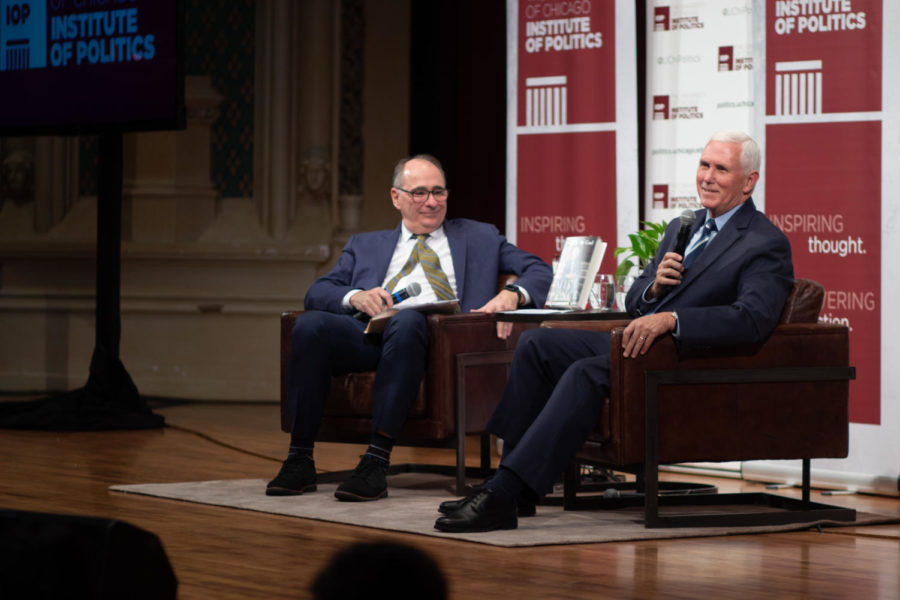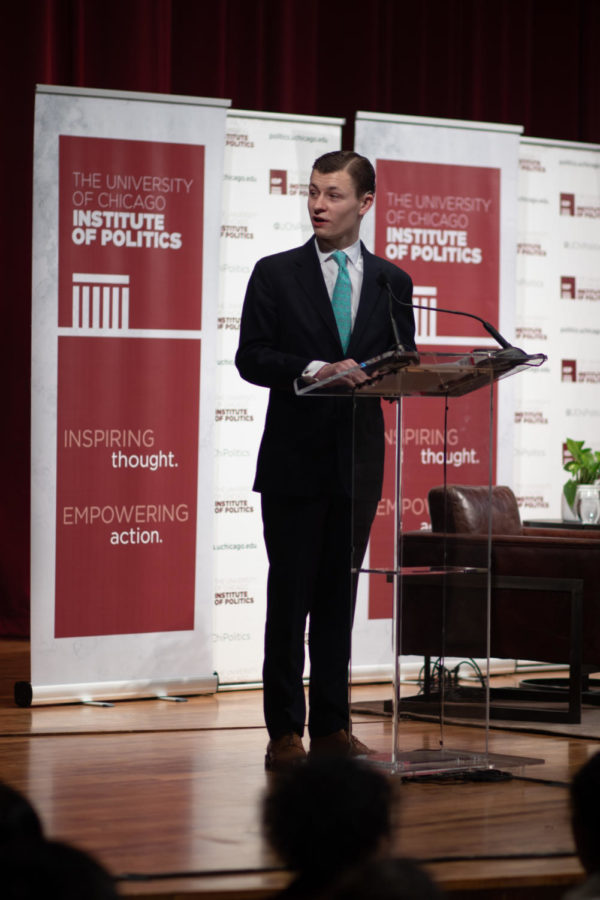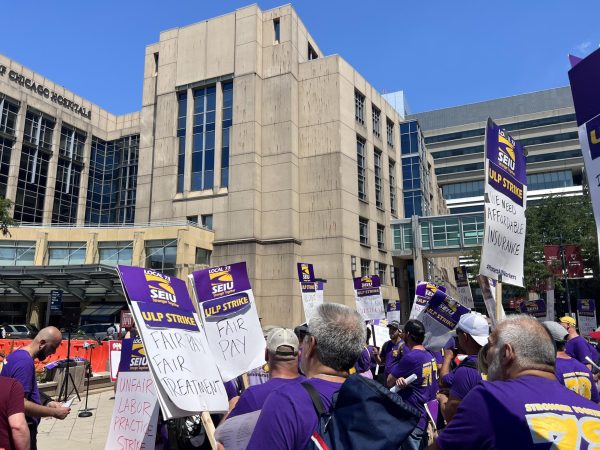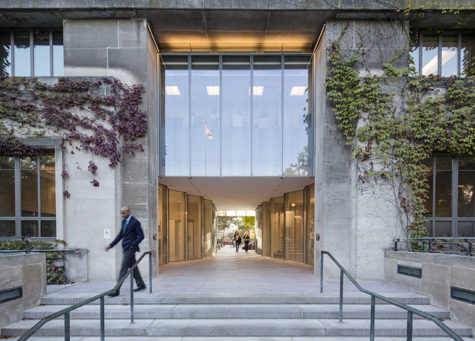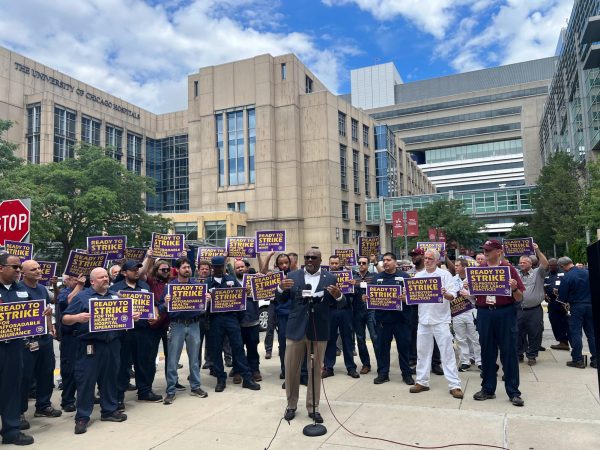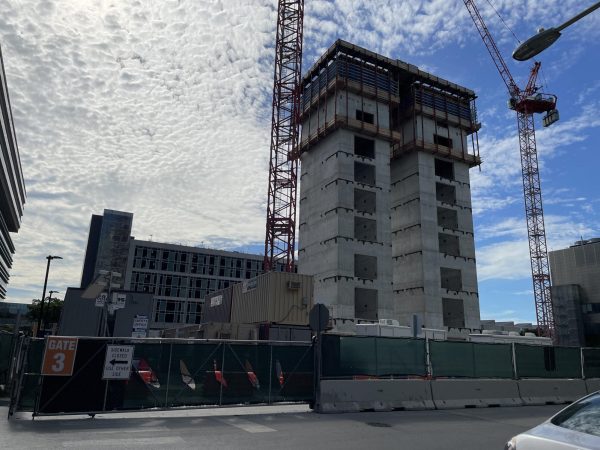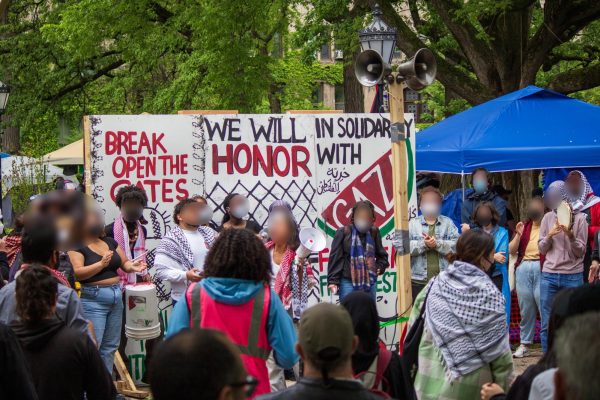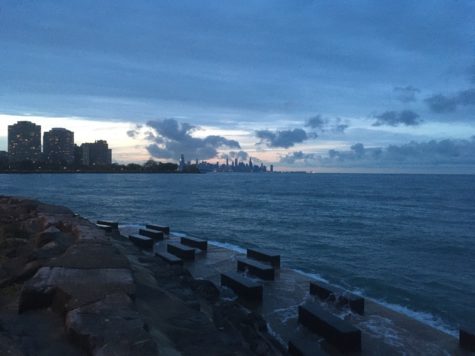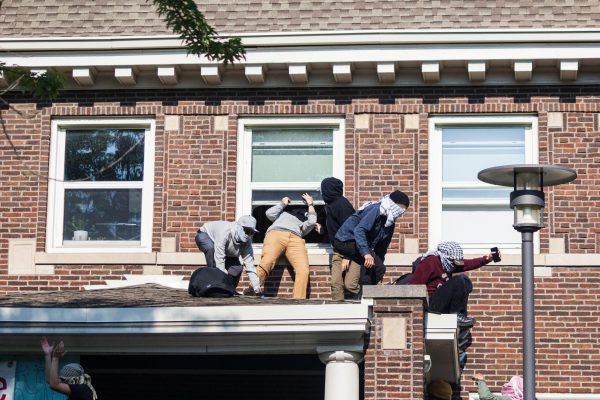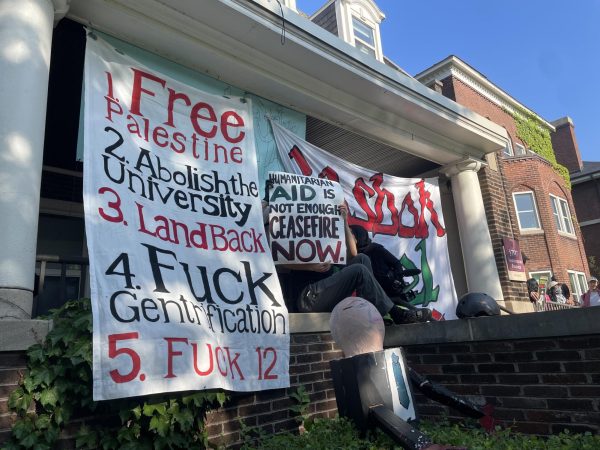Mike Pence Discusses Controversial Issues, Eyes 2024 Presidential Run at IOP Event
Pence reiterates support for the Second Amendment, his opposition to abortion, and his criticism of the January 6 insurrection.
Former Vice President Mike Pence answers a question from a student.
January 10, 2023
Former Vice President Mike Pence weighed in on abortion rights, public safety, immigration, healthcare, and the January 6 insurrection during an Institute of Politics (IOP) event at Mandel Hall on November 29. Pence also hinted at a desire to run for president in 2024.
The talk was moderated by David Axelrod, the outgoing IOP director and former chief strategist for Barack Obama’s presidential campaign.
Pence represented Indiana’s Second Congressional District from 2001 to 2003 and Indiana’s Sixth Congressional District from 2003 to 2013. From 2009 to 2011, Pence chaired the House Republican Conference. In 2012, he was elected to a four-year term as governor of Indiana.
In July 2016, Pence withdrew from his campaign to be reelected Indiana governor in order to become Republican presidential nominee Donald Trump’s running mate. After Trump won the presidential election, Pence concluded his governorship of Indiana on January 9, 2017, and was inaugurated as Vice President on January 20, 2017.
Trump appointed Pence to head the country’s coronavirus response in February 2020. Following the 2020 presidential election and insurrection two months later, Pence garnered bipartisan praise for countering Trump’s demands to block certification of election results.
Pence frequently describes himself in public appearances as “a Christian, a conservative, and a Republican, in that order.” As the governor of Indiana from 2013 to 2017, he championed the largest tax cut in the state’s history. Pence is an outspoken advocate for limiting the role of government, protecting gun rights, restricting abortion access, and supporting the coal industry over renewable energy.
Third-year Declan Hurley—the editor-in-chief of the Chicago Thinker, a student-run conservative publication—introduced Pence by outlining his fiscal accomplishments as governor of Indiana and by highlighting his opposition to Trump’s attempts to overturn the 2020 presidential election.
Axelrod began the conversation by asking Pence about how to neutralize the rhetoric surrounding immigration, saying that there seemed to be “political currency in demonizing immigrants.” In response, Pence agreed with the need for civility in political discourse but emphasized that “a nation with no borders is no nation at all.”
Pence recalled what he considered the biggest accomplishment of the Trump administration’s immigration policy: the Migrant Protection Protocols, colloquially known as the “Remain in Mexico” program. This program allowed the government to return asylum seekers to Mexico while their applications were reviewed by the court system.
Reflecting on the 2022 midterm elections, in which the Republicans regained control of the House of Representatives after losing it in 2018, Pence believed that the most successful Republican candidates focused on issues that affect the future, such as crime, immigration, and inflation. By contrast, Republican candidates that centered their campaign around the past, specifically on denying the results of the 2020 presidential election, lose their respective races.
“We need to be the party of the future,” Pence said.
While the controversy over the 2020 presidential election has cast a shadow over the Republican Party, so too has the 2016 election, when allegations surfaced that the Russian government had interfered to assist the Trump campaign. Pence denied the claims of collusion at the time even though he later condemned Russian President Vladimir Putin for interfering with the electoral process during a 2018 cyber security summit. At the talk, Pence told Axelrod that “Russia did not collude with either campaign. Russia sowed discord.”
When discussing the current war between Russia and Ukraine, Pence alluded to his support of Ukrainian fighters. “The United States needs to send an unambiguous message about Ukraine,” Pence said.
On the topic of public safety and gun rights, Pence recalled the Greenwood Park Mall shooting on July 17, 2022, in which a mass shooter, who killed three and injured two, was shot and killed by an armed civilian. “The best response to a bad guy with a gun is a good guy with a gun,” he said, reiterating a phrase commonly used by Republicans as a solution to mass shootings in the United States.
Pence said he considers the Second Amendment, which enshrines the right to bear arms, to be “as important as the First Amendment,” but said he was willing to consider gun control measures that “meet the moment without compromising the rights of citizens.”
In terms of abortion rights, Axelrod raised what he views as a public rejection of abortion restrictions since Roe v. Wade was overturned by the Supreme Court in June. In referenda across red and purple states like Michigan, Kentucky, and Kansas, voters rejected restrictions on abortions, and midterm exit polls also show that abortion rights were a strong motivator for Democratic turnout. In 2017, Trump signed legislation that allowed states to defund clinics that provide abortion services such as Planned Parenthood. The administration also eliminated $200 million worth of federal grants to teen pregnancy prevention programs.
“I am pro-life, I don’t apologize for it, and I welcome the decision of the Supreme Court because it returns the decision to the state,” Pence said about Roe v. Wade. Pence brought up his signing of the first Pre-K funding bill in Indiana history as a measure to support women and children. He also brought up his support of the 2022 Hyde Amendment, which prevents Medicaid dollars from being allocated towards abortions with exceptions including cases of rape, incest, or the endangerment of the life of the mother.
Pence then addressed his role in the January 6 insurrection. He emphasized that, on the day, he “shared the concerns of millions of Americans about irregularities, but there was never evidence of widespread fraud.” Nonetheless, Trump tried to pressure Pence into overturning the election results and refused to rein in his supporters when they breached the Capital building, many with the desire to inflict physical harm on Pence.
Axelrod asked Pence of Trump, “How can you vote for the guy?” Pence replied that “at that moment, he decided to be a part of the problem,” even while he and Congress “did [their] duty that day.” Pence then hinted at a presidential run of his own in 2024, when Joe Biden’s present term ends: “I may not just be stepping in the voting booth, I may be stepping in Iowa and New Hampshire and South Carolina, and we’re going to follow our calling wherever it leads.”


